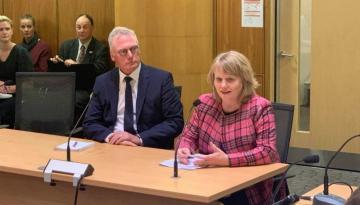The parents of a daughter with cystic fibrosis have cycled 1300km from Dunedin to Wellington towing a coffin to send a message to politicians that Pharmac is underfunded.
Julian and Camilla Cox arrived in Wellington on Wednesday afternoon where they met with members of Patient Voice Aotearoa along with some patients and whānau to deliver the coffin to Parliament steps.
The group are demanding more funding for the Government's drug buying agency Pharmac and an external review, in the hopes that the current budget of more than $1 billion - following a $60 million injection - will be doubled.
"500 New Zealanders suffer from cystic fibrosis and our daughter Rachel is one of those people," Julian Cox told the crowd gathered outside Parliament Buildings.
"There are now new drugs that can provide our daughter, as well as others with cystic fibrosis, with long, healthy lives... The bad news is these drugs are funded overseas but not in New Zealand."
The march to Parliament steps was going well, with advocates hugging and greeting each other while signing the symbolic coffin with messages of hope.
But it turned ugly when the marchers arrived at the steps of Parliament and were told by security that they couldn't congregate around the main steps and had to move about 50 metres away to the smaller steps next to the flagpoles.
Camilla Cox appeared to be highly offended. With tears in her eyes, she launched into an attack on politicians, telling gatherers: "It tells us about the priorities of a group of people who are running this country".
"We have cycled 1300km to make a change for our child and for all the people we have met on our long journey, to arrive here and have people bickering about 50 metres - how pathetic!
"Every moment that the Government does nothing about the funding for Pharmac they have blood on their hands... Families are dying and being torn apart and we have small-minded people bickering over 50 metres on public space.
"You ask how I feel. I'm furious, I'm disgusted and I'm disappointed with our politicians. We have met so many amazing people on this trip - New Zealanders deserve better."

Camilla's husband then delivered a speech to Prime Minister Jacinda Ardern.
"Jacinda, you are our elected leader and you have led the world at showing compassion at times of crisis, especially after the Christchurch shootings and the Whakaari/White Island eruption," Julian said.
"Right now, we have another crisis that is costing lives on a daily basis - it's called Pharmac and we need you to show both your world-famous empathy and leadership by giving the agency the money it needs to make a difference.
"Jacinda, we've travelled 1300km towing a coffin to save our daughter. How far will you go?"
The father of three daughters acknowledged Pharmac had made progress on funding some new drugs, pointing to the announcement last week to fund cancer drugs.
The Government gave Pharmac a $40 million boost in Budget 2019, which paid for new medicines to be available, following several protests and petitions.
And in September, the Government unveiled a $60 million cash injection over two years into Pharmac as part of its 10-year cancer plan.

But it's not enough for Julian and Camilla.
"We like to call ourselves as an egalitarian society but those who can afford $70,000 for medicines, well, that's nice... if you can afford it," Julian said. "It's not nice if you have to re-mortgage your home."
He could be overheard talking to cancer drug advocate Malcolm Mulholland at the gathering about discussing "court action under the Treaty of Waitangi".
Pointing to the coffin attached to the bikes he and his wife rode to Wellington, Julian said: "If you look at some of the messages on the coffin, 'Please I want to live', it's heart-wrenching.
"It shouldn't be necessary of the parents of a chronically ill child to take this sort of action... It's just horrific in New Zealand."
Late last year, Pharmac's chief executive Sarah Fitt defended the drug-buying agency in the face of petitioners calling for more drugs to be funded, pointing to financial constraints.
"You can't ignore the cost," she told members of the Health Select Committee. "We're not arguing whether these medicines work or don't work."



